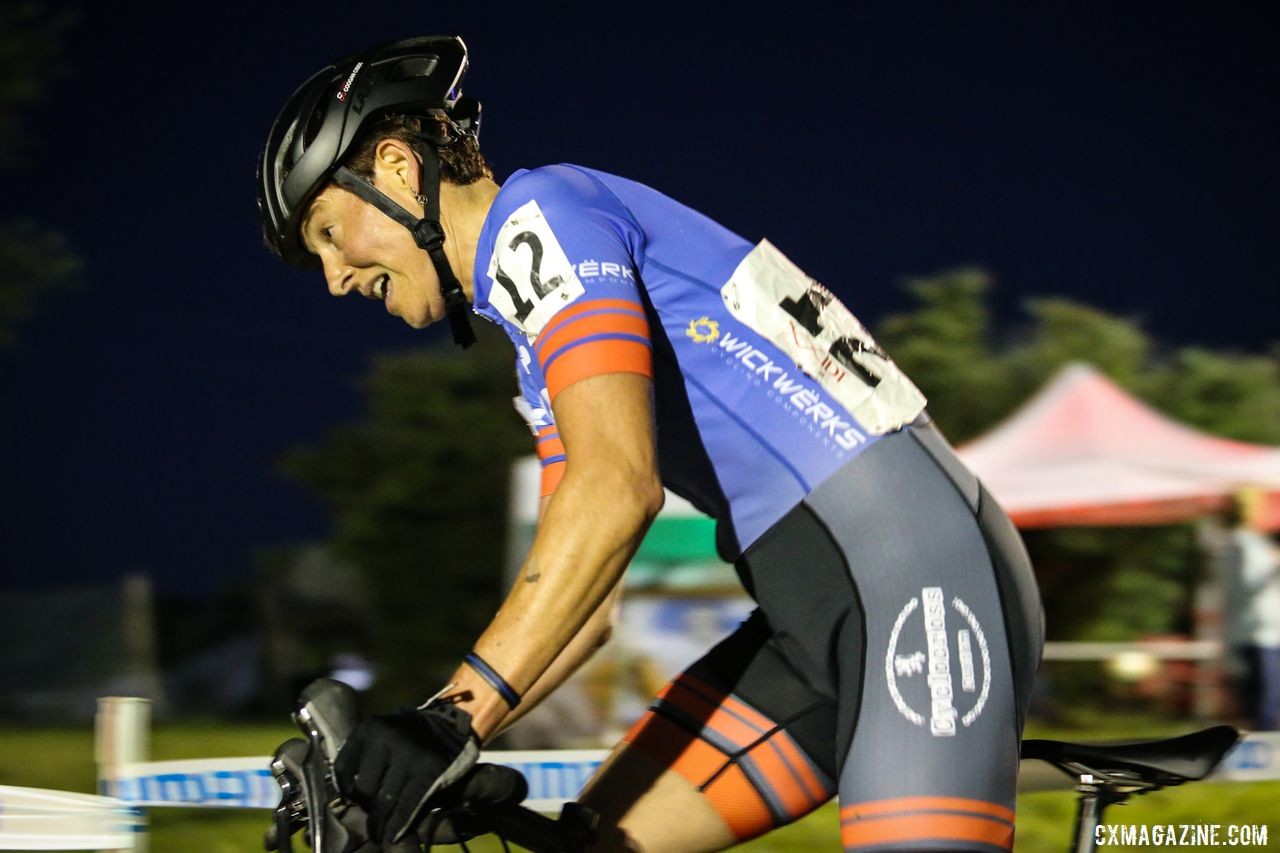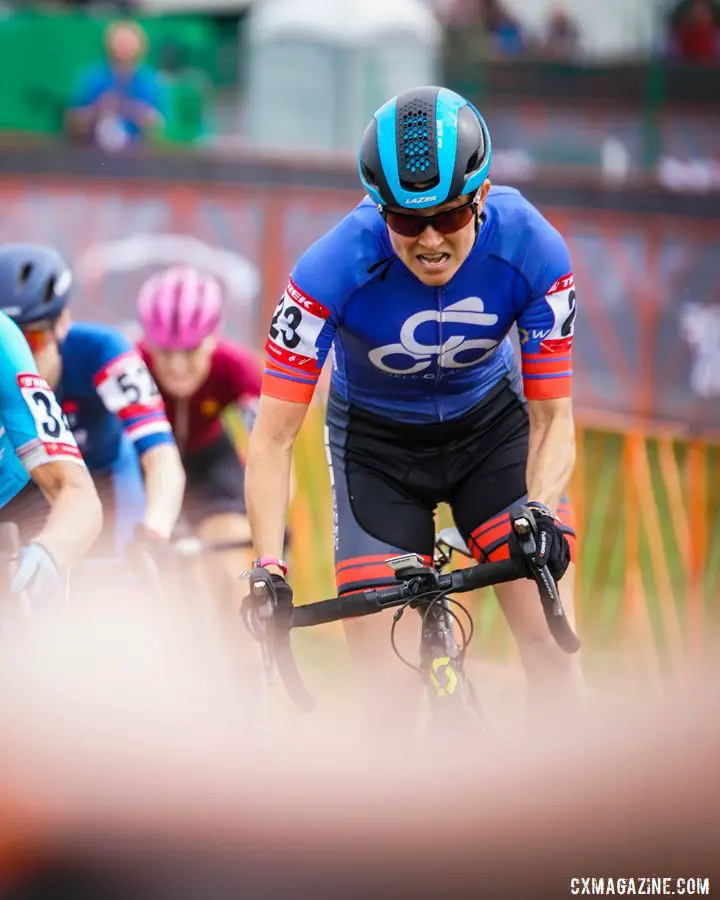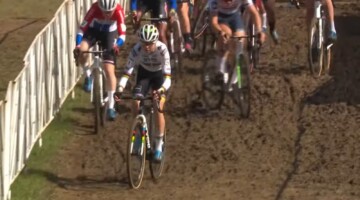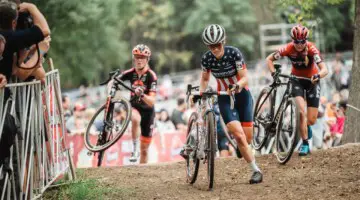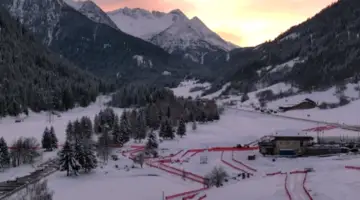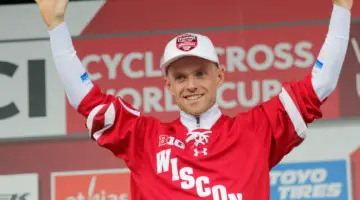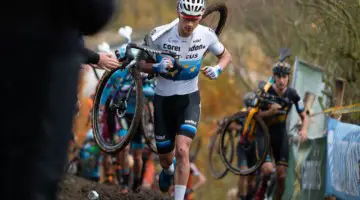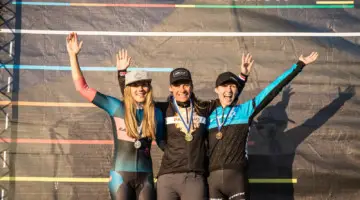At this point in my career, my interest and focus often seem split.
On one hand, I’m concerned with maximizing my own performance. On the other hand, I am coaching a few athletes, as well as mentoring some headed to Europe, and enjoying every minute of it.
I was a post-Title IX baby and have spent my entire life in sport from junior alpine skiing to elite Nordic skiing and now cyclocross. This perspective makes me keenly interested in athlete development.
As I completed my last racing and training block at Jingle Cross and Trek Cup, I did so with an eye on what was going on around me development-wise.
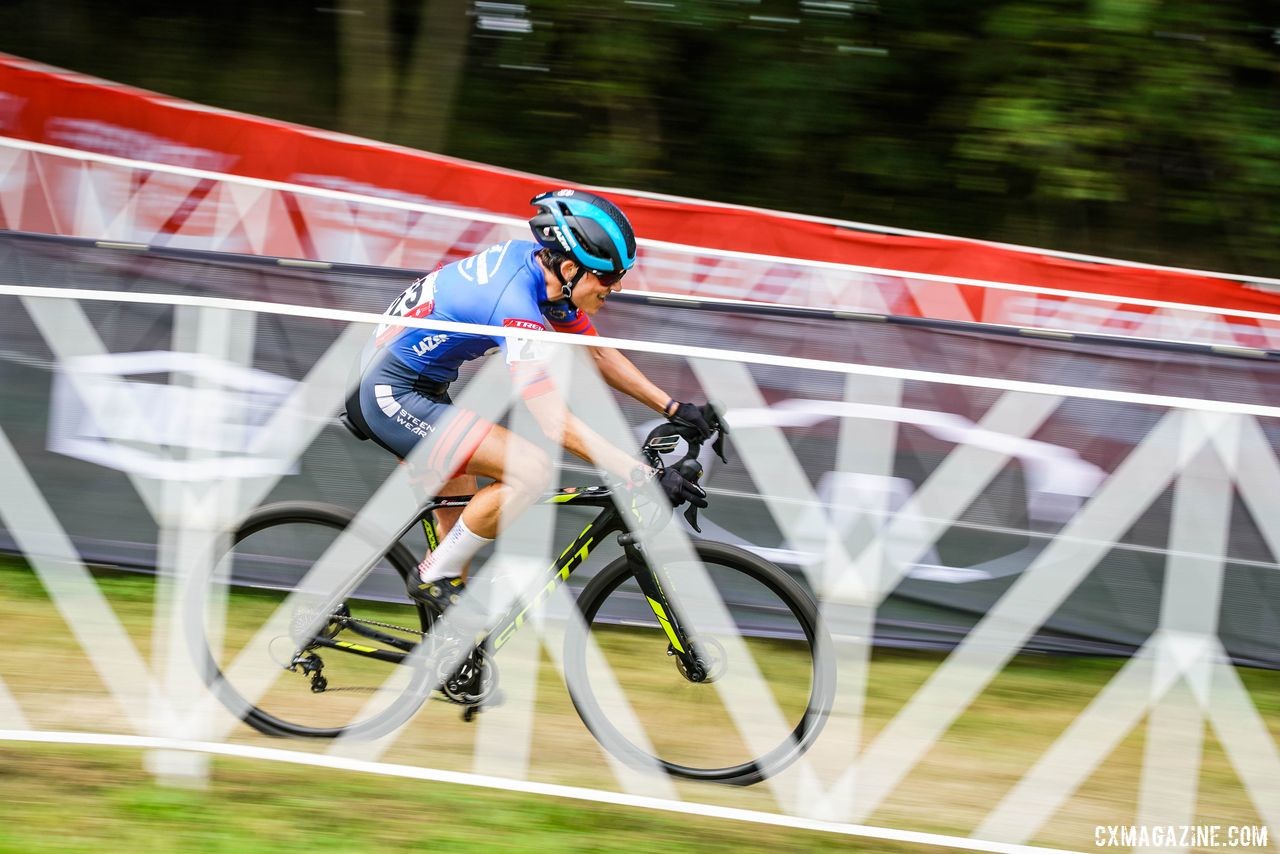
Corey Coogan Cisek kept her eye out for what was going on from a development standpoint during the U.S. World Cups. © Paul Vassalotti
Support is Everything
It’s amazing how quickly I’ve fallen out of touch with American cyclocross. I drove into the parking lot in Iowa City and my first thought was, “Look at all the tents.”
There’s been a lot of low chatter about the state of American cyclocross. I cannot argue: attendance at Jingle Cross is way down since the booming party that was the World Cup’s first year. But the tents…
In recent history, North America has transitioned from land of the pro team to land of the privateer. Yet, looking around, I conclude, “we” are not looking half bad.
Last year, it felt a little bit like Cannondale and Trek Factory Racing were the only North American teams “who came to the party,” what with their big, multi-tent setups. Last weekend, there was Pactimo Colorado Proud, Kona Maxxis Shimano and Specialized-Feedback Sports with a large footprint, as well as a whole host of teams looking decidedly “pro.”
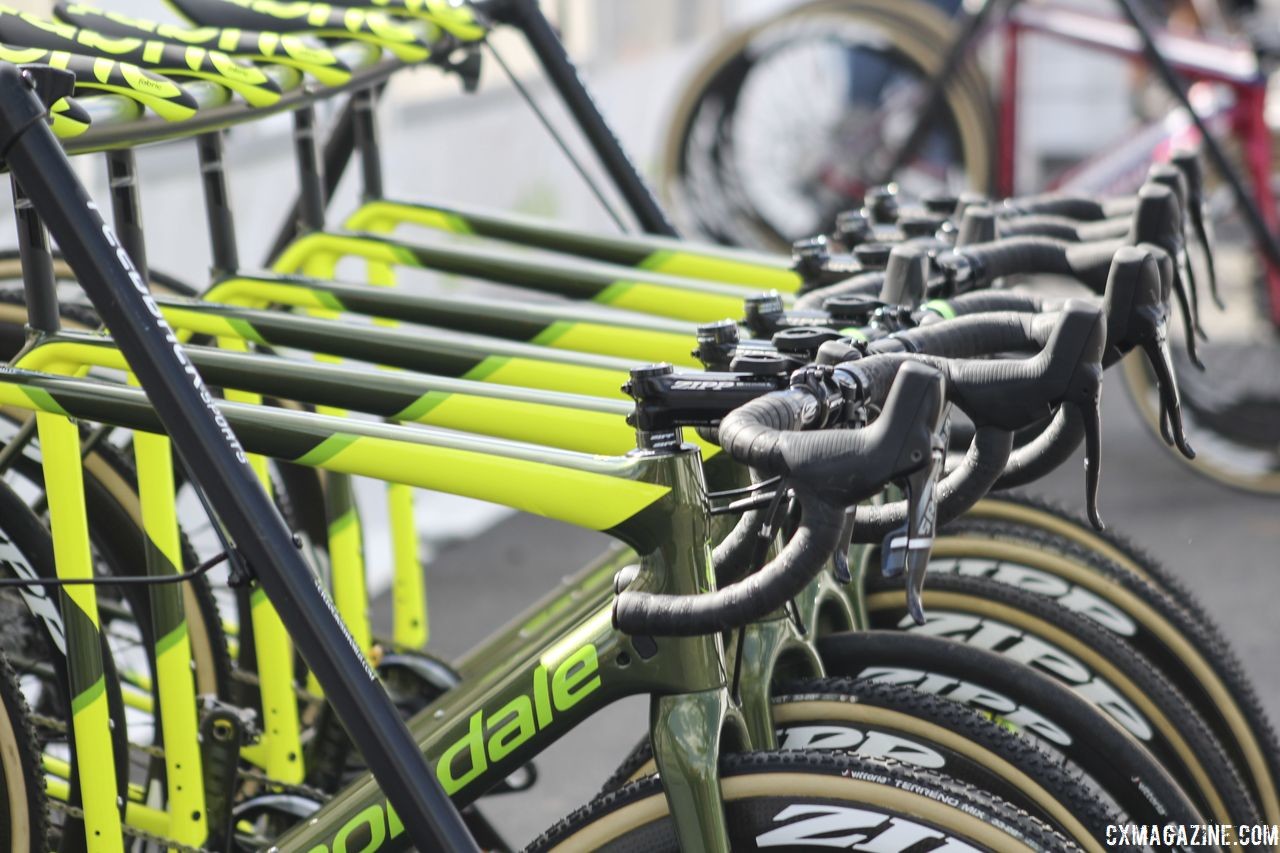
In the past, the Cannondale p/b CyclocrossWorld tent has been one of the teams with a large footprint at U.S. races. © Cyclocross Magazine
Of course, I recognize that none of this came easily. Many of these teams were built as a result of a lot of hard work and superior project management on the part of one or more of the team’s riders. Rarely, nowadays, does a rider get a contract that allows them to “just ride.” Likewise, it’s impossible to know the behind the scenes reality. A shiny tent does not necessarily mean superior support.
Nevertheless, it appears that a number of North Americans have good race day support. Having done the hard work to secure financial support, infrastructure and hire staff, riders are able to focus on preride, tire/pressure selection, number pinning and warmup on race day.
Many of the Junior teams are even more dialed. Given superior coach/director and mom/dad efforts, riders have a great space to warm-up and are not washing their own bikes prerace. (It’s likely they also have assistance scouting the lines and dialing in tire pressure.)
Looking around at these tents reminded me that cyclocross has unusual barriers to rising through the ranks. This isn’t a criterium. It’s much harder to show up with just one bike, warm-up on the road and then record a winning performance.
The other day I had a conversation with an athlete who I coach. She traveled to a major national race solo and, not surprisingly, found the experience overwhelming. The long drive, lack of team tent, two bikes, piles of gear and all-the-mud proved a lot to manage.
Cyclocross, worldwide, is built on family support teams. Do you remember Sanne Cant’s family getting in a skirmish at the Valkenburg World Championships?
The fight itself is unimportant. The takeaway is that her family is a major part of her support team. That’s extremely common in the low countries. Manon Bakker, winner of Friday night at Jingle Cross, brought her dad from the Netherlands to pit for her. And who can forget Lucinda Brand’s father’s botched handoff at last year’s Worlds?
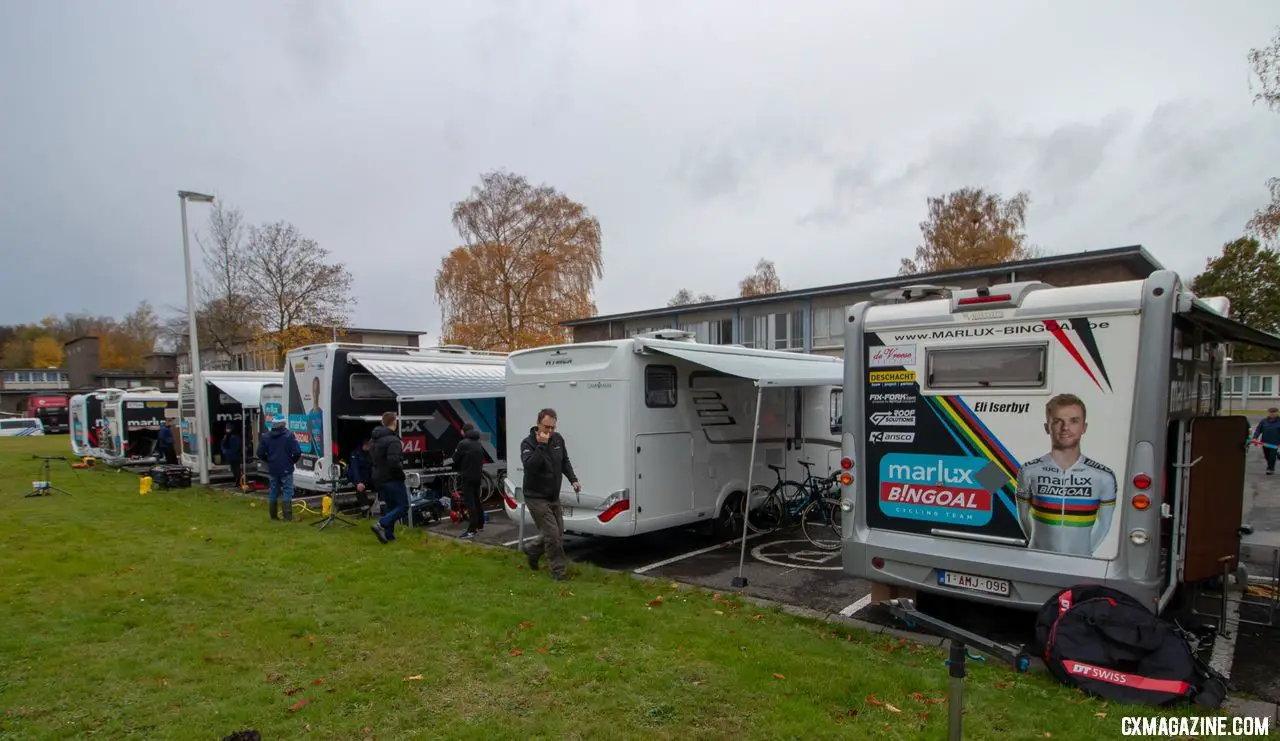
Many European pros have their own campers and familial support. 2018 Superprestige Gavere Men. © A. Yee / Cyclocross Magazine
Then there are the famous cyclocross couples: Helen and Stef Wyman, Katie Compton and Mark Legg and Maghalie Rochette and David Gagnon.
But what if you start this support in adulthood (your parents don’t develop as support staff) and you lack a partner, or one who is qualified and/or willing to be your mechanic?
It’s possible to succeed, but it’s challenging.
The central nervous system tires as a result of physical and mental stress, including solo drives and hours spent bike washing and cleaning and seeking “emergency” mechanical assistance.
As a younger athlete, I glanced into the pro tents with jealousy. However, it never occurred to me that having your bike cleaned was anything more than a luxury.
Turns out, it’s not just tradition that results in riders sitting in folding chairs beneath the team tent pinning numbers. Over the ages, teams have recognized that keeping riders rested is an advantage.
This is why we need more teams like the Amy D. Foundation. Our Juniors are well-supported. Our pros are well-supported. Our emerging 20 and 30-somethings may or may not be, depending on their life circumstances. What Amy D. provides is an opportunity for a rider to “just race” without support worries.
Add this to my post-racing to-do list: create opportunities for emerging 20 and 30-something riders.
On the Power of Training With Others
I stayed down in Iowa City between Jingle Cross and Trek Cup with the express purpose of training with my coach Helen Wyman and her Experza Pro CX team.
We were not alone in choosing to stay in Iowa City. There’s a local loop north of the city in North Liberty that crosses the Iowa River several times, including at the Coralville Dam. The loop is gently rolling (surprisingly hilly for the area) and twisty.
Helen tells me the loop reminds the Euros of home as the roads are not the predictable grid pattern of so many Midwestern roads.
When we did a loop together on Tuesday morning, we saw Courtney McFadden, Team S&M CX, Maud Kaptheijns and Manon Bakker all within the space of a single hour. Essentially, it was your average, ordinary morning on these Iowa roads!
In many ways, Helen is the reason those roads were so crowded. She was the “first Euro CX racer” to venture to this part of the world.
Riding with Helen and Experza’s Anna Kay, I was treated to Anna’s wonderment regarding the size of the homes and lots we passed. The football stadium at North Liberty High School was particularly remarked upon. Anna shared her surprise at the largeness of everything in America: large homes, large meals, large coffees…
I attempted to illustrate the size of my home by comparing it to many of the garages that we passed, but I doubt they believed me. They probably imagine me living in one of those palatial suburban homes.
Helen had this “ambitious” idea that Anna and I could do our intervals side-by-side. I wasn’t so sure about this. I mean, let’s not count the number of minutes that Anna beat me by at Jingle!
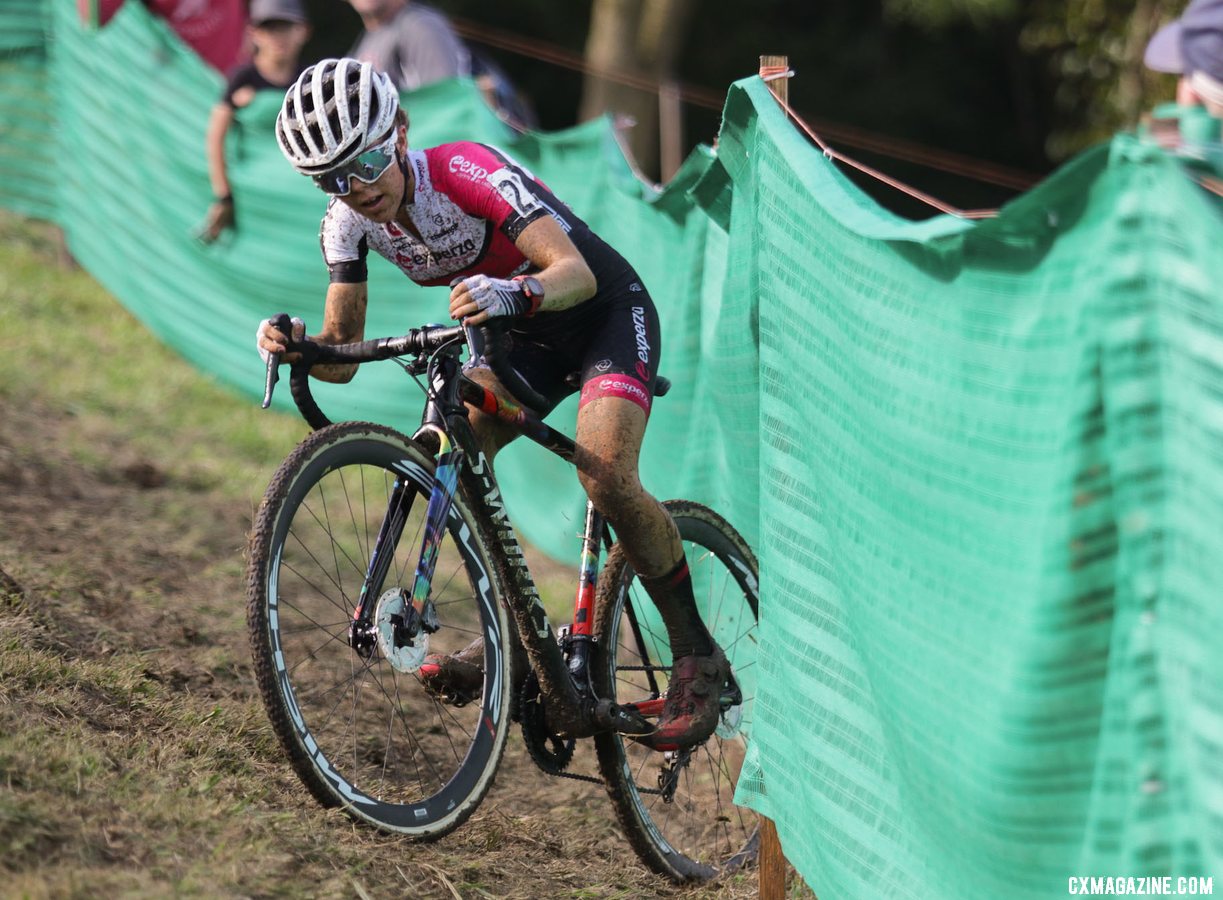
Anna Kay had a strong ride on Day 3 of Jingle Cross. 2019 Jingle Cross Sunday UCI C1, Elite Women. © D. Mable / Cyclocross Magazine
Despite Helen’s assurances that “all would be fine,” I awoke that morning with my stomach rumbling with nerves the likes of race day. Profound visions of being dropped danced in my head.
To my surprise and relief, it went well. My worst fears did not come true. In fact, I more than held my own. The pressure of training with Anna fueled some good efforts on my part.
Actually, for both of us, it showed the impact of training with a partner. We agreed that each of us brought a bit more effort to every single interval. It also made the challenging intervals a bit more tolerable.
For me, this workout brought a pretty large surge of confidence.
Heard of the central governor theory? It’s real, and it’s profound. To a huge degree, you become who you “think” you are. In races, we all self-select our own comfortable position: “She is ahead of me. She is behind me. Okay, this seems about right. I can settle in here.”
I think I have a tendency to sell myself short. As coach put it, “Sometimes we underestimate ourselves and need to be reminded that we are good.”
Finding a reason to believe in yourself is a gift. Failing to believe in oneself is a noose.
The Experza Pro CX Model
I think it’s fair to say that Experza Pro CX made an impression at the American World Cups. If you haven’t heard of Experza Pro CX, it’s time you paid attention.
Experza Pro CX is the Belgian-based team that Helen moved to in early 2019. With Helen now retired, the team consists of young talent: U23s Anna Kay and Manon Bakker and young elites Alicia Franck and Marion Norbert Riberolle.
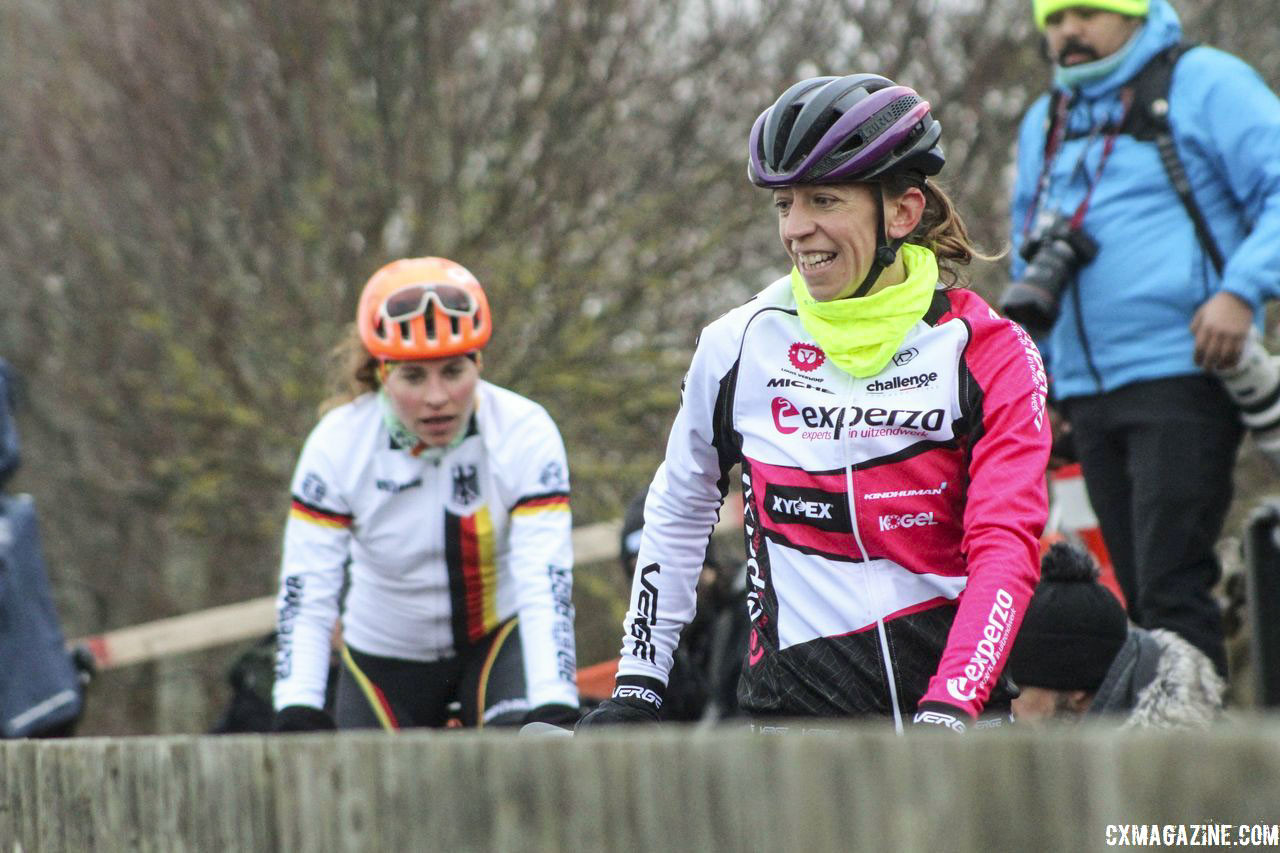
Helen Wyman switched to the Experza Pro CX team at the end of her career. 2019 Bogense World Championships Course Inspection, Friday Afternoon. © Z. Schuster / Cyclocross Magazine
I’ve watched these riders from a distance via Helen’s social media and via my friendship with Alicia. What they have going is unique and impactful.
Helen has taken on a staff role in the team. Since spring, the riders have benefitted from her mentorship at a series of training camps in both Belgium and Southern France.
While road and cyclocross teams traditionally have a team camp or two, Experza has taken this to a new level with many off-season contact days, including some road racing. (They also have a road team.)
With Helen’s retirement, there is no clear team leader. In fact, all the riders are similar in age, experience and results. This provides a unique opportunity for growth. Think of the impact of similarly able riders pushing each other day after day.
At the Belgium UCI season opener in Eeklo, all three Experza starters had good days with Anna finishing on the podium and Manon and Alicia within the top-10.
Imagine it had gone differently and only one had posted a great result. The other two might have experienced some frustration, mostly because they understood themselves to be as capable as their teammate. If your teammate who you compete with day after day in training wins, you understand, “I have what it takes.”
Add to the post-racing to-do list: create opportunities for developing riders to work together.
Choose Your own Narrative
Looking back at my own races at Jingle and Trek Cup, I’m having trouble picking a narrative.
On the whole, I did not get the results for which I had hoped.
Likewise, the racing block ended on a low note when I came down with a cold immediately following the Trek Friday C2. Rather than race the amateur races as planned, I made a hasty retreat homeward for some rest. It’s tempting to see the whole week as a downward spiral ending in implosion.
Continuing my Roanoke trend, I had a lot of “heat stress” moments on my Midwestern tour. On the “hot days” at Jingle and Trek, I was putting together great races before suddenly and dramatically cracking in the late laps. My “cracks” seem heat-induced. I don’t think I’ll be able to level-set my form until I get some cool races under my belt.
It’s easy to focus on these negatives. In fact, the mind is programmed to strongly remember bad experiences, presumably to prevent recurrences.
However, focusing on the negatives would be a mistake. Failing to see the positives ensures a zero-percent chance of moving forward. The skills that I enhanced over the summer—power-to-weight, sprinting, and running—were present and accounted for in my racing. My ride with Anna suggested that I have what it takes on the road.
It’s just the beginning of the season. Only 5 months left! I have only one domestic race remaining on the calendar in FayetteCross next weekend.
In less than a month, I’ll be on the other side of the ocean. With the help of my supporters, I’ll try to solve that challenging and murky puzzle: how to translate fitness to performance, this time in Europe.













